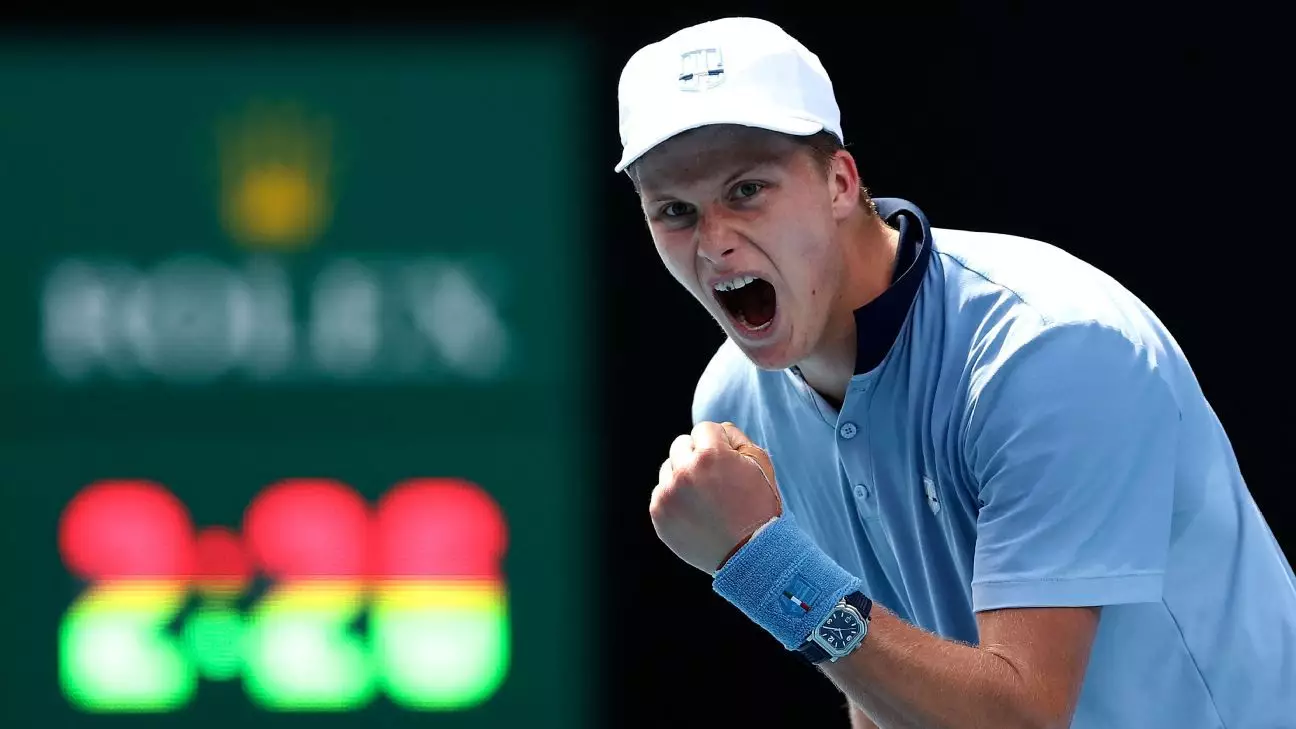Jenson Brooksby, a young American tennis player with significant promise, has experienced a roller coaster of emotions and challenges that have marked his career journey. While he initially emerged as a rising star capable of making waves at Grand Slam events, he faced a near two-year hiatus that reshaped both his professional life and personal identity. From battling injuries to navigating the intricate workings of tennis regulations, Brooksby’s story is emblematic of resilience and the quest for self-acceptance. Now 24 years old, he is attempting to make a comeback to the professional circuit after a series of setbacks that have left him unranked, a drastic change from securing a No. 33 ATP ranking at just 21.
The lapse from professional tennis was filled with not only physical injuries but also mental and emotional strains. Brooksby candidly expressed how the prolonged absence from the sport rendered him vulnerable to feelings of depression. Reflecting on this turbulent phase, he stated, “Multiple bad things just happened at once,” indicating the compounded nature of his struggles. His narrative urges us to explore the psychological toll that professional sports can inflict, especially when exacerbated by unforeseen circumstances.
In a recent interview, Brooksby opened up about his life on the autism spectrum, a topic he has kept private until now. This admission signifies more than just personal disclosure; it represents a broader conversation about autism in high-stress environments like competitive sports. He revealed, “I just want people to know me for who I am fully, and that’s just another part of me.” This statement is pivotal as it highlights the importance of embracing one’s identity rather than hiding it, even in the face of societal skepticism.
Brooksby described how autism, despite its challenges, serves as a source of strength during critical moments of competition. His ability to focus intensely on specific details can offer an edge in high-pressure scenarios that many athletes may not possess. Yet, it is crucial to address the flip side: how emotional outbursts can complicate his game. This duality within his experience showcases the complexity of autism—it can be a weapon of focus but also a source of volatility. His athletic trainer keeps a watchful eye on Brooksby’s emotional states, indicating how vital support systems are within sports.
His challenges extend beyond personal struggles as he navigates the regulatory landscape of professional tennis. Brooksby’s recent suspension by the International Tennis Integrity Agency (ITIA) due to missed drug tests paints a troubling picture of the pressure athletes face in adhering to stringent norms while they battle personal issues. Notably, he emphasized that his situation stemmed from miscommunication rather than negligence, illustrating the often murky waters interns must traverse in professional sports.
The eventual reduction of his suspension from 18 months to a mere few months is a testament to perseverance and perhaps a reflection of how sports organizations are beginning to reconcile with unique circumstances faced by athletes like Brooksby. He expressed optimism in returning to the ATP tour, stating that his appeal involved input from professionals who understand autism, demonstrating how personal narratives can influence broader institutional processes.
Looking ahead, Brooksby is set to return to competitive play at lower-tier Challenger tournaments, beginning in Canberra, Australia. Those close to him, including his coaches, recognize the talent within and are committed to honing his skills. Eric Nunez, one of his coaches, believes Brooksby possesses the potential to ascend to the ATP’s top 10—a bold statement reflecting the faith they have in his capabilities.
While Brooksby’s life has taken unforeseen turns, the future is not bleak. He has dedicated this time off the tour not just to recover physically but also to improve his game strategically. This determination to rise and return to elite competition is a testament to his character—a characteristic many might overlook in discussions focused solely on tangible athletic prowess.
Jenson Brooksby’s journey in the realm of tennis is emblematic of many young athletes facing multifaceted challenges in their pursuit of greatness. With a blend of talent, fortitude, and newfound openness regarding his autism spectrum disorder, Brooksby is not just preparing to return to the tennis courts; he is also crafting a narrative that goes beyond the sport itself. His story invites us to reflect on how we can support athletes holistically, appreciating the personal complexities that shape their professional journeys. As Brooksby ventures into a new chapter, he does so with a renewed sense of self and determination that will undoubtedly resonate with many fans and fellow athletes.


Leave a Reply